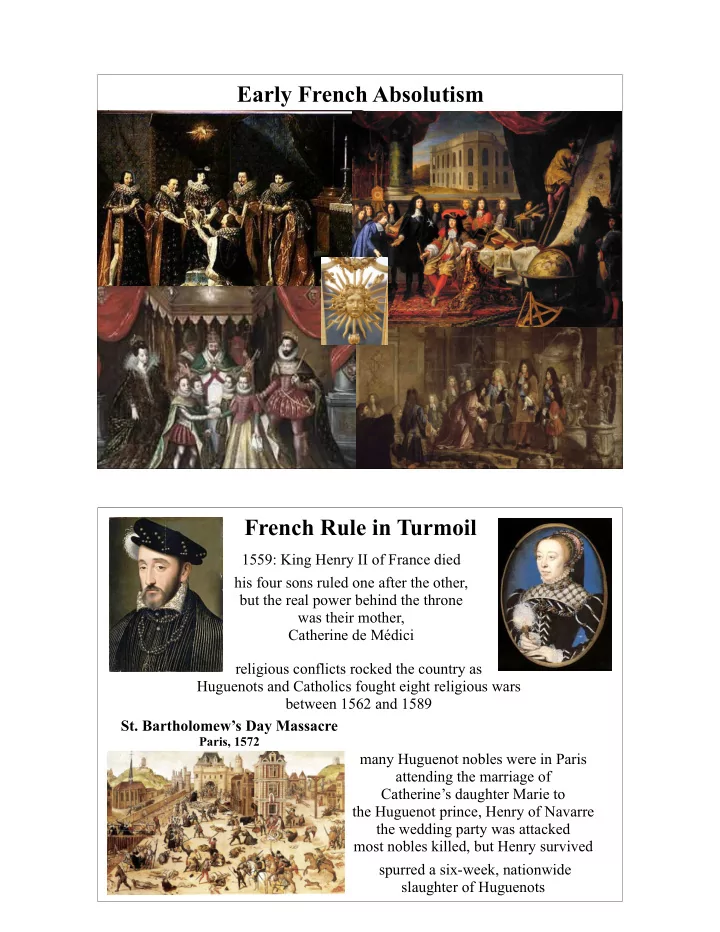

Early French Absolutism French Rule in Turmoil 1559: King Henry II of France died ! his four sons ruled one after the other, but the real power behind the throne was their mother, Catherine de Médici religious conflicts rocked the country as Huguenots and Catholics fought eight religious wars between 1562 and 1589 St. Bartholomew’s Day Massacre Paris, 1572 many Huguenot nobles were in Paris attending the marriage of Catherine’s daughter Marie to the Huguenot prince, Henry of Navarre the wedding party was attacked most nobles killed, but Henry survived ! spurred a six-week, nationwide slaughter of Huguenots
Henry of Navarre Descended from the popular medieval king Louis IX, Henry was robust, athletic, and handsome. ! Prince Henry inherited the throne of France in 1589, becoming Henry IV, the first king of the Bourbon dynasty in France. ! Many Catholics, especially Parisians, opposed a Protestant king. ! Henry chose to convert from Protestantism and become a Catholic, saying “Paris is well worth a mass.” Edict of Nantes In 1598, Henry declared that the Huguenots could live in peace in France and set up their own houses of worship in some cities. ! This declaration of religious toleration was called the Edict of Nantes. Henry devoted his reign to rebuilding France and its prosperity. ! He restored the French monarchy to a strong position. After a generation of war, most French people welcomed peace, but some hated Henry for his religious compromises. ! In 1610, a fanatic leaped into the royal carriage and stabbed Henry to death.
Cardinal Richelieu After Henry’s assassination, his son Louis XIII became king at the age of eight-and-a-half. ! His mother Marie de’ Medici acted as Regent until 1617. ! Louis’ initial reign was weak, but then he appointed Cardinal Richelieu as his chief minister in 1624. Louis XIII Richelieu’s goal was to increase the power of the Bourbon monarchy, which he did at the expense of the Huguenots. ! He believed that Protestantism was a breeding ground for political conspiracies against the Catholic king. ! As such, he forbade Protestant cities to have walls so they could not defy the king and then withdraw behind strong defenses. Cardinal Richelieu Richelieu Consolidates Power Richelieu also sought to weaken the nobles’ power against the king. He ordered nobles to take down their fortified castles. ! He appointed more government agents from the middle class than from the noble class. ! To make France the strongest state in Europe, Richelieu sought to limit Hapsburg power by involving France in the Thirty Years’ War. ! The Hapsburgs ruled Spain, Austria, the Netherlands, and parts of the Holy Roman Empire (the lands surrounding France). ! Richelieu would die in 1642, six years before the end of the Thirty Years’ War.
Louis XIV Comes to Power One year after Richelieu’s death, Louis XIII, sensing his own demise, put his affairs in order. ! Custom would have made his wife, Queen Anne, the sole Regent of France. Doubting her political abilities, he decreed that a regency council would rule on four-year-old Louis XIV’s behalf (with her as head of the council). Cardinal Mazarin Richelieu’s successor, Cardinal Mazarin, was credited with ending the Thirty Years’ War. ! Many people in France, particularly the nobles, hated Mazarin because he increased taxes and strengthened the central government. From 1648 to 1653, violent anti-Mazarin riots tore France apart and included threats on the young king’s life by nobles. ! In the end, the nobles’ rebellion failed: > Its leaders distrusted each another even more than they distrusted Mazarin. > The government used violent repression. > Peasants and townspeople grew weary of disorder and fighting. ! For many years afterward, the French would accept the oppressive laws of an absolute king, convinced that the alternative - rebellion - was even worse. ! Even after the violence was over, Louis never forgot his fear and anger. ! He determined to become so strong that the nobility could never threaten him again.
Recommend
More recommend